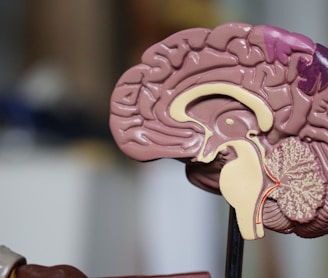Sleep and the Brain: Why Rest Is the Most Powerful Thing You Can Do for Your Mind
LIFESTYLEALL BLOGS


You may think of sleep as “doing nothing.” But inside your brain, it’s the most active and healing time of the day.
While you sleep, your brain is cleaning, sorting, resetting, and even learning. Miss enough sleep, and your memory, mood, focus, and creativity all start to break down. Over time, poor sleep is even linked to anxiety, depression, brain fog, and a higher risk of diseases like Alzheimer’s.
Let’s look at what happens to your brain when you don’t sleep, and how to use sleep as your brain’s secret weapon.
What does your brain do while you sleep?
It clears waste. Your brain has a cleansing system called the glymphatic system that flushes out toxins while you sleep. This includes beta-amyloid, the waste linked to Alzheimer’s disease. It stores memory. During sleep, your brain moves short-term memories into long-term storage and deletes what’s not important. It resets emotions. Sleep helps regulate the amygdala, the brain’s fear center. With good sleep, you feel calmer and less reactive. It repairs brain cells. Sleep triggers the release of growth hormone, helping repair neurons and restore brain function. It recharges your focus. The prefrontal cortex, your brain’s control center, needs sleep to work properly. This helps with decision-making, attention, and learning.
What happens to your brain when you don’t sleep?
You forget things. Sleep-deprived brains can’t move memories into long-term storage.
You feel moody or anxious. Lack of sleep increases cortisol, the stress hormone, and disrupts emotional balance.
You lose focus. Attention span drops, reaction time slows, and it becomes harder to think clearly.
You crave sugar. Poor sleep reduces leptin and increases ghrelin, two hormones that make you feel hungrier and crave fast energy from sugar or carbs.
You age faster. Chronic sleep loss increases inflammation and accelerates brain aging.
What does science say?
A 2017 study in Nature Neuroscience showed that sleep deprivation disrupts communication between neurons, making thinking slower and memory weaker.
Research from Science in 2013 revealed that the brain’s glymphatic system is 10 times more active during sleep, removing harmful waste that builds up while awake.
A 2019 article in The Lancet Psychiatry found that even one night of poor sleep increased anxiety by 30 percent in healthy adults.
A 2021 study in Sleep Health showed that teens who got less than 7 hours of sleep had higher levels of sadness, irritability, and lower academic performance.
How to improve sleep and protect your brain
Keep a regular bedtime. Sleep and wake at the same time daily—even on weekends.
Get morning light. Natural light early in the day resets your circadian rhythm.
Avoid screens 1 hour before bed. Blue light from phones and laptops delays melatonin, your sleep hormone.
Cool your room. The ideal sleep temperature is between 60 and 67°F.
Eat earlier. Avoid heavy meals and sugar 2 to 3 hours before bed.
Try sleep-supporting foods. Bananas, oats, almonds, tart cherries, and herbal teas (like chamomile) support melatonin naturally.
Clear your mind. Journal your thoughts, read, or practice deep breathing to relax your brain before sleep.
Final thought
Sleep isn’t a luxury; it’s your brain’s reset button. Every night you get deep, high-quality sleep, you are literally healing your mind, protecting your memory, and strengthening your focus. The smartest thing you can do for your brain is go to bed. Because while you rest, your brain gets to work.